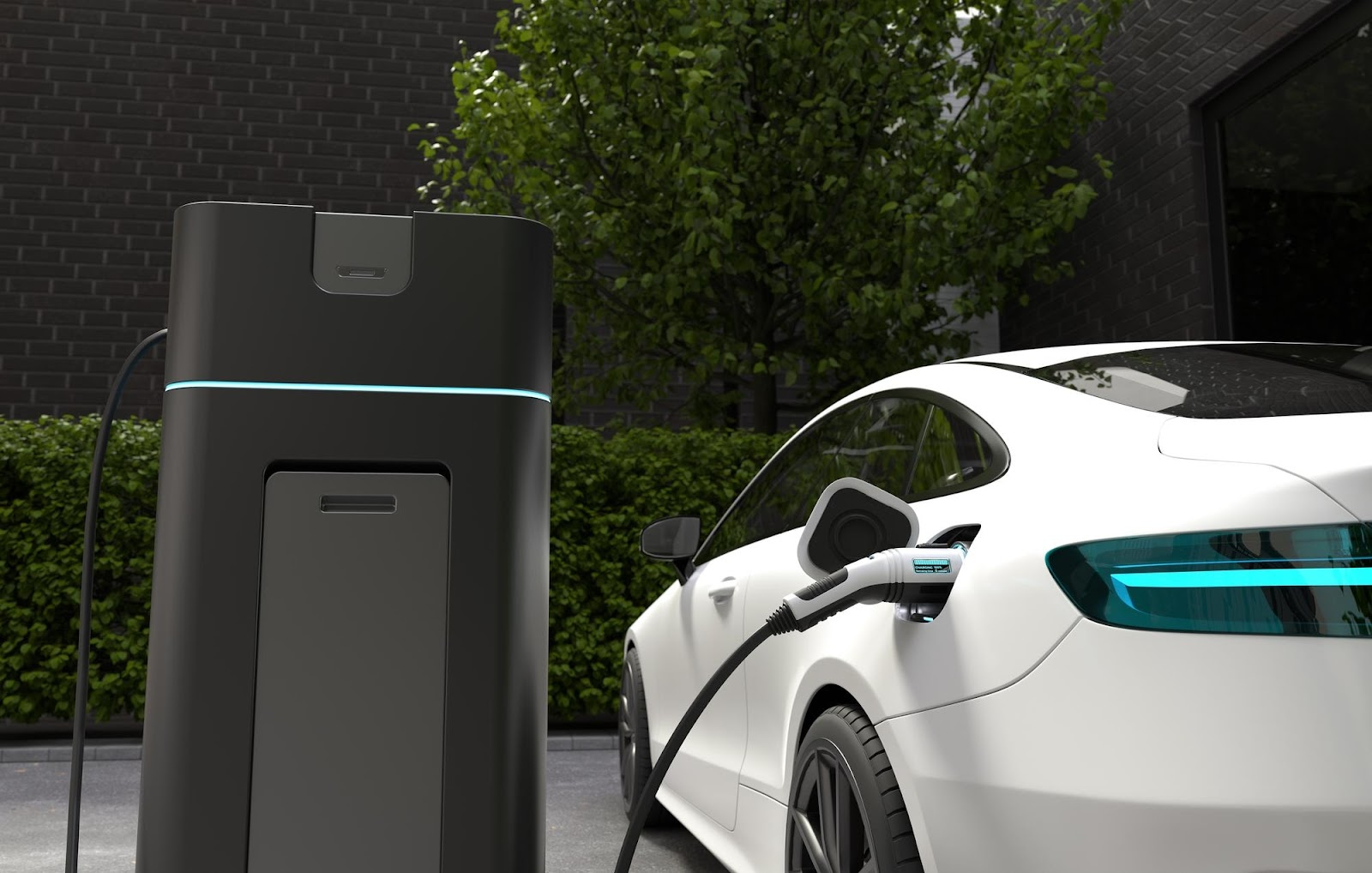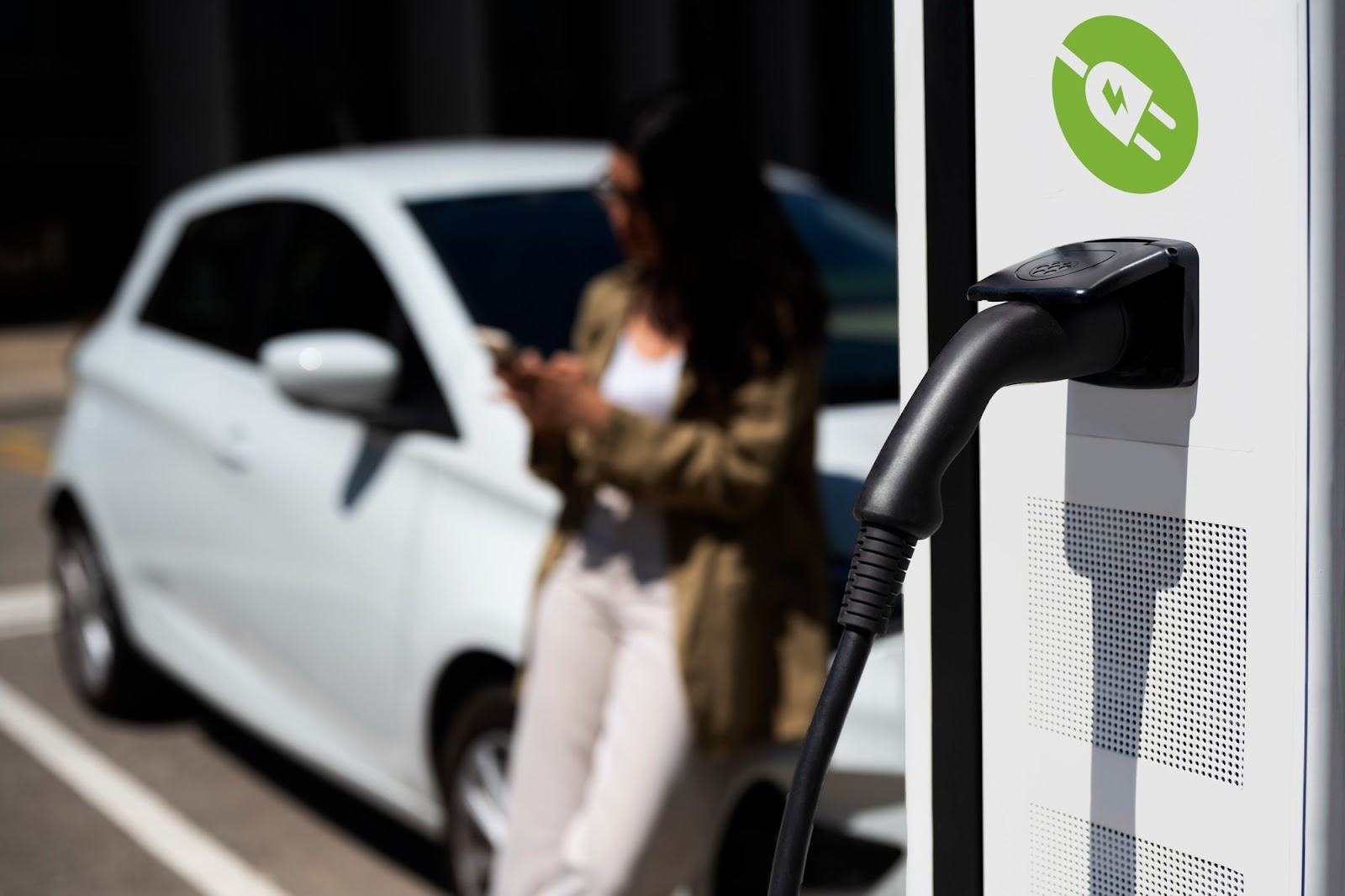How do you make your commercial property stand out while tapping into a fast-growing market?
For many businesses, the answer is installing a commercial EV charging station. With more drivers switching to electric vehicles every year, the demand for reliable, accessible charging options keeps rising.
Commercial properties that offer EV charging don’t just meet that demand. They attract customers, increase foot traffic, and strengthen their brand’s reputation.
But getting a station installed isn’t just about buying the equipment and flipping a switch. It takes smart planning, the right location, clear permits, and ongoing maintenance to make sure your investment pays off.
This guide walks you through what you need to know, from the types of chargers available to the permits required, pricing factors, installation timelines, and upkeep.
What is a Commercial EV Charging Station?
A commercial EV charging station is a charging setup designed for commercial properties, businesses, or public spaces, giving EV drivers a place to power up while on the go.
Unlike home chargers, commercial EV chargers are built to handle higher traffic and offer faster charging options. This is what makes them ideal for serving commercial customers or attracting visitors.
These stations help businesses meet the growing demand from EV owners and add value to shopping centers, workplaces, hotels, and other public areas.
With the rise of electric vehicles, having a charging station on-site can maximize foot traffic, customer satisfaction, and even brand image.
Most commercial charging stations offer a mix of options, including:
- Level 2 chargers: Provide a full charge in a few hours, making them a good fit for workplaces, retail parking lots, or businesses where drivers spend more time on-site.
- DC fast chargers: Deliver a significant charge in 30 to 60 minutes, ideal for quick-stop locations like convenience stores, gas stations, or highway rest stops.
- Networked chargers: Offer connected features that track usage, allow for customer payments, and help businesses monitor charging activity across multiple locations.
As more drivers switch to electric vehicles, businesses that install commercial EV chargers position themselves as forward-thinking and customer-focused.
Benefits of Having an EV Charging Station on Your Commercial Property
Installing EV charging solutions on your commercial property supports your business by drawing customers, boosting employee perks, and helping you meet sustainability goals.
An on-site charging option also positions your property as a forward-thinking destination in a market where demand is rising.
Key benefits include:
- Attract more customers: Charging stations bring in EV owners, increase foot traffic, and encourage longer visits.
- Increase employee satisfaction: Providing charging at work can improve staff perks and help with retention.
- Maximize the customer experience: Offering convenient charging improves how visitors view your business and services.
- Support sustainability goals: Visible charging stations show your commitment to clean energy and responsible practices.
- Claim tax credits and available rebates: Many federal and local programs offer financial incentives for installing chargers.
- Simplify the process with turnkey solutions: Installation partners can handle site planning, permits, and setup.
- Prepare for future demand: Choosing the right charger depending on your business needs keeps you ready as more drivers switch to electric.
What Permits Do You Need For Commercial EV Charging Stations?
Permits are a key part of any EV charger installation on a commercial property. Local agencies, utility providers, and zoning boards often have strict requirements that can vary depending on location. Getting approvals in place early helps you avoid project delays or extra costs.
Most cities require permits for:
- Electrical work: Ensures your chargers meet safety and capacity standards.
- Site modifications: Covers construction, trenching, or parking adjustments.
- Zoning compliance: Confirms that charging stations fit the property’s approved use.
- Accessibility and signage: Makes sure your station meets ADA rules and local sign codes.
If your retail location sits in a busy area, permits may also involve traffic impact reviews or public access checks. Some jurisdictions require coordination with utility providers before installation can even begin.
Permitting can be time-consuming and complicated, especially if you’re adding chargers at multiple locations or across different cities. That said, you may need a permit expeditor to speed up the process.
Do You Need A Permit For Home EV Chargers?
If you’re installing a home EV charger, you may still need a permit, even though the process is often simpler than for commercial projects. In many cities, residential electrical work requires a permit to make sure the installation meets local building codes and safety standards.
For a basic Level 1 charger that plugs into a standard outlet, you likely won’t need special approval. But for Level 2 chargers, which require a 240-volt connection, most areas expect you to pull an electrical permit and possibly schedule an inspection after installation.
Permit rules can vary depending on your location. Some cities have streamlined processes for home chargers, while others treat them like any other electrical upgrade. It’s always smart to check with your local building department before hiring an installer or starting the project.
Permits help protect you from faulty wiring, overloaded circuits, or other risks that could damage your home or vehicle. Plus, having a permitted installation may be required by your insurance company or HOA.
What Are the Best Locations For Commercial EV Chargers?
The best places for commercial EV chargers are:
- Easy to spot
- Convenient to access
- Located where EV drivers already spend time
For example, a grocery store parking lot near a highway exit can attract regular shoppers and drivers passing through. This means they can serve daily customers while capturing additional traffic. It’s a win for both convenience and exposure.
Commercial property owners should also factor in installation costs. Sites closer to power sources, parking areas, and utility connections tend to cost less to set up. On the other hand, locations requiring power upgrades or long trenching may drive expenses higher.
In many regions, local zoning rules and EV charging infrastructure guidelines will also influence site choices. Choosing the right location helps you meet local standards, attract more users, and maximize your return on investment.
Popular locations for commercial chargers include:
- Shopping centers and retail stores
- Hotels and hospitality properties
- Office parks and business campuses
- Highway rest stops and travel plazas
- Public parking garages and city lots
- Multi-family housing complexes
How Much Do EV Charging Stations Cost?
Of course, the cost of installing a commercial EV charging station includes more than just the hardware. It’s a combination of equipment, site preparation, and ongoing expenses. All of this can add up depending on your installation requirements and long-term plans.
Here are the main factors that impact pricing:
Charging Equipment
The charger itself is the core investment, and prices vary based on type:
- Level 2 Chargers are common in workplaces and retail lots. They typically cost between $5,000 and $10,000 per port, depending on brand and features.
- DC Fast Chargers are much more expensive, with units often starting around $20,000 to $50,000 each. Higher-capacity models or multi-port units can exceed $100,000.
- CHAdeMO Connectors and combined fast-charging systems add to the price if you want to serve a wider range of vehicles.
Faster chargers deliver more power but require bigger electrical infrastructure, which can drive up both equipment and installation costs.
Site Work and Power Upgrades
The cost of installation is often shaped by your site conditions. Key factors include:
- Trenching and wiring: The farther your charger is from the power source, the more you’ll pay for digging, conduit, and electrical connections.
- Power upgrades: Older properties may need new panels, transformers, or service upgrades, especially for DC fast chargers that demand higher capacity.
- Concrete work or parking modifications: If you need to rework parking lots, curbs, or accessibility features, this adds to the price.
Expect site prep costs to range from a few thousand dollars to tens of thousands, depending on the scope.
Payment Systems and Network Fees
If you want to offer public charging, you’ll need networked payment systems. These allow users to pay with cards, apps, or subscriptions. Costs include:
- Hardware installation for the payment system
- Setup fees with network providers
- Ongoing service fees; some providers charge a flat rate, others take a percentage of transaction revenue
On average, network service fees range from $200 to $800 per year per charger, plus transaction costs.
Solar Panels and Backup Systems
Some businesses choose to offset energy costs with solar panels or add battery storage for backup power. This is optional, but it can make sense for properties with sustainability goals.
- Solar panel installations vary but typically cost $2.50 to $4 per watt, depending on system size.
- Battery storage systems can range from $10,000 to $100,000, depending on capacity and usage.
While solar can lower long-term power bills, the upfront investment adds a significant cost to the project.
Regular Maintenance and Software Updates
Ongoing upkeep is a necessary part of owning charging stations. This includes:
- Hardware inspections to check cables, connectors, and housing
- Charger software updates for performance and security
- Cleaning and basic maintenance to protect the equipment from wear
- Data monitoring and usage reports to track performance and catch issues early
Maintenance contracts often cost $300 to $1,000 per charger per year, depending on service level. Keeping chargers in good condition helps avoid downtime and keeps the customer experience high.
Permits, Approvals, and Compliance
You’ll need to budget for local permitting, inspections, and utility approvals. Costs may include:
- Permit application fees
- Review costs for zoning or building compliance
- Utility coordination charges
- Inspection fees
These can total anywhere from a few hundred to several thousand dollars per site.
Final Cost Range
There’s no single price tag, but here’s a rough estimate per charger:
- Level 2 chargers (installed): $7,000 to $15,000 each
- DC fast chargers (installed): $50,000 to $150,000 each
Larger projects with multiple chargers, extensive site work, or premium features can push costs even higher.
Are There Incentives and Tax Credits For EV Charging Stations?
Yes, federal, state, and even local governments offer a variety of incentives and tax credits to encourage businesses to install EV charging stations. These programs can reduce both your upfront costs and long-term expenses and can make your investment more affordable.
At the federal level, the Alternative Fuel Infrastructure Tax Credit allows eligible businesses to claim up to 30% of the cost of purchase and installation, capped at $100,000 per property. This applies to both equipment and installation expenses.
Many states and utility companies also offer rebates, grants, or tax credits. Some examples include:
- State rebates on equipment or installation costs
- Utility company grants for EV charging infrastructure upgrades
- Reduced electric rates for commercial charging stations
- Local incentives for placing chargers in key areas like high-traffic public sites
Incentives often depend on location, charger type, and usage model. Public access chargers, for example, may qualify for larger credits than private ones.
How Long Do EV Charger Installations Take?
The timeline for installing a commercial EV charging station can range from a few weeks to several months, depending on the complexity of the project.
Simple installations with standard Level 2 chargers and existing electrical infrastructure may move quickly, especially if permits and approvals are secured early.
Projects that involve charging power upgrades, utility coordination, or significant site work often take longer. In some cases, waiting on utility approvals or specialized equipment can extend timelines by several weeks.
Adding features like charging station software for network management, payments, or monitoring can also impact the schedule if setup or integration takes extra time.
Businesses planning a full range of services, such as multiple charging points, DC fast chargers, or solar-backed systems, should expect a longer lead time due to added installation steps and inspections. Delays can also happen if zoning issues or unexpected site conditions come up during the process.
All that said, starting with a clear plan and working with an experienced team helps reduce surprises and keeps the project moving forward.
How Do You Maintain Commercial EV Charging Stations?
Like any equipment, chargers need regular attention to stay reliable and deliver a good experience for EV drivers.
Key areas to focus on include:
- Charger software updates: Regular updates fix bugs, improve performance, and add new features to keep your system current.
- Hardware inspections: Routine checks make sure cables, connectors, and screens are in good shape, especially for DC fast charging units.
- Usage reports: Monitoring data from your chargers helps track performance, spot issues early, and plan for maintenance or upgrades.
- Payment systems and connectivity: Making sure payment networks and apps stay connected prevents service disruptions for customers (and profit losses for you).
- Cleaning and upkeep: Keeping the stations clean and free of debris protects the equipment and improves customer satisfaction.
Investing in ongoing maintenance helps avoid costly downtime and keeps your charging stations future-proof as technology evolves. A well-maintained system also protects your reputation by making sure customers always find working, dependable chargers when they visit your site.
What Connectors Do Commercial EV Charging Stations Use?
When installing a commercial EV charging station, connector compatibility is a key decision. Different vehicles use different plugs, and offering the right types can make your station more appealing to both individual drivers and fleet managers looking for reliable access.
The connector also affects the charging speed and the kind of vehicles you’ll attract. So, here’s what you need to know:
- J1772: Standard for Level 2 charging. This works with most EVs in North America, though Tesla vehicles require an adapter.
- CHAdeMO: Used mainly by Japanese brands like Nissan and Mitsubishi, often paired with DC fast chargers.
- CCS (Combined Charging System): Popular among U.S. and European automakers, this fast-charging option is becoming the industry standard.
- Tesla Connector: Designed for Tesla vehicles, though many drivers carry adapters for non-Tesla stations.
If you want to serve a full range of EV drivers, offering a combination of CCS, CHAdeMO, and J1772 covers most models.
It’s also important to plan for future demand, as the more charging port options you provide, the more drivers and fleets your station will attract.
Build Your EV Charging Project With Help From Permit Place
Installing a commercial EV charging station means making smart choices about location, permits, installation costs, and long-term maintenance. Every step matters, whether it’s securing the right approvals or keeping your chargers reliable for customers.
Don’t have the time or bandwidth to do it all yourself?
At Permit Place, we take the stress of permitting off your plate. We handle due diligence, entitlements, and all the approvals your project needs, so you don’t waste time chasing paperwork or dealing with red tape.
If you want your EV charging project to move forward without costly delays or surprises, we’re ready to help you get there.
Get a quote from Permit Place today.
FAQs About Commercial EV Charging Station Installation
How much does a commercial EV charging station cost to install?
Costs vary based on charger type, site work, and utility upgrades. A Level 2 charger may cost between $5,000 and $10,000 per port, while DC fast chargers often start around $20,000 to $50,000 each, plus installation, permits, and network fees.
How much profit does a commercial EV charging station make?
Profit depends on location, pricing, and usage. High-traffic spots tend to earn more through charging fees or increased customer traffic. While margins per charge are often small, adding charging can optimize overall business revenue by attracting more visitors.
How to set up an EV charging station business?
Start with market research, choose high-traffic locations, and partner with an equipment provider. You’ll also need to secure permits, work with utility companies, and set up payment systems. Working with experienced contractors and permitting partners helps streamline the process.
What power is required for a commercial EV charging station?
Power needs depend on the charger type. Level 2 chargers typically require a 240-volt connection, while DC fast chargers may need access to 480-volt service and higher-capacity transformers. Always check local utility requirements before installation.



